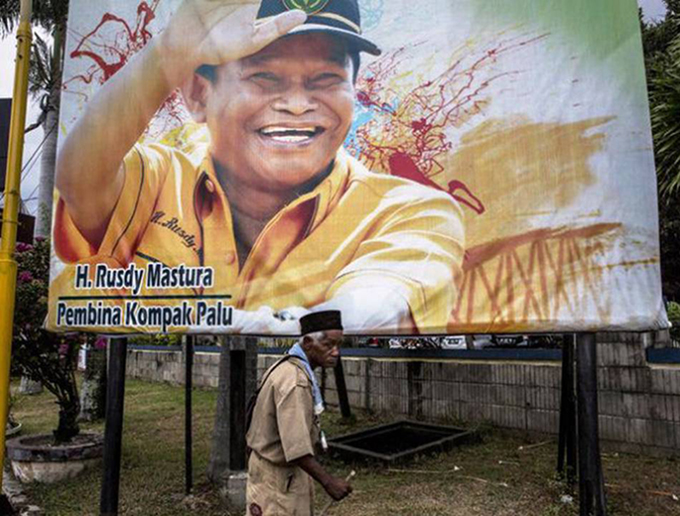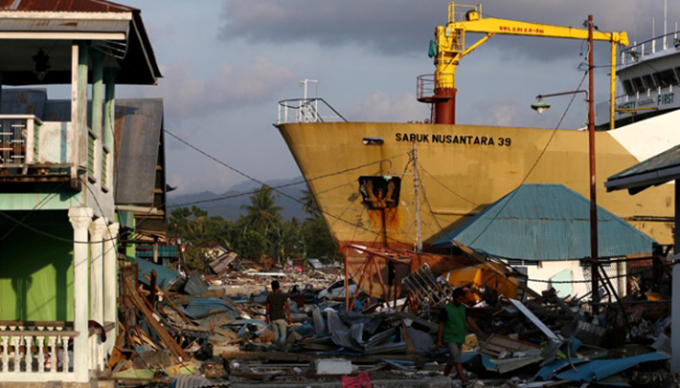
ANALYSIS: By Dr Vannessa Hearman
When the earthquake and tsunami hit the city of Palu, Central Sulawesi, last weekend, they not only brought wreckage and death. The twin disasters also swept away efforts by activists and the municipal administration to support the survivors of Indonesia’s violent anti-communist purges in 1965-1966.
In the rest of the country, such survivors are still very marginalised.
In Palu, a city of some 350,000 inhabitants and the capital of Central Sulawesi province, activists had convinced local government leaders to work with them in helping these survivors.
READ MORE: One week on, Palu quake survivors begin to worry about the future
Palu is the only place in Indonesia where a government leader has made an official apology to the victims of the anti-communist violence in the area. Some nine days after the devastating natural disaster, the fate of some of those activists is still unknown.
Indonesian people lived under Suharto’s New Order authoritarian regime between 1968 and 1998, when the president was forced to resign. From 1965-66, the army, under Suharto, spearheaded anti-communist operations that killed half a million people and led to the detention of hundreds of thousands.
The army blamed Indonesia’s Communist Party (PKI) for the murder of seven army officers on the night of 30 September and in the early hours of 1 October, 1965, by a group calling itself the Thirtieth September Movement. The 53rd anniversary of these events coincided with the terrible disaster in Central Sulawesi.

In 2012, the Palu mayor, Rusdy Mastura, apologised to the victims of the anti-communist violence. He pledged to provide assistance to them and their families in the interests of “equality, openness and humanitarian considerations”.
In his speech, Mastura recalled how, as a boy scout in 1965, he had been tasked with guarding leftist detainees.
Victims of abuses
Mastura was speaking at an event organised by local human rights group, SKP-HAM (Solidaritas Korban Pelanggaran Hak Asasi Manusia, Solidarity with Victims of Human Rights Abuses).
SKP-HAM was founded in 2004. Its best-known leader is the dynamic secretary, Nurlaela Lamasitudju, the daughter of local Islamic cleric, Abdul Karim Lamasitudju.
SKP-HAM is part of the national Coalition for Truth and Justice (Koalisi Pengungkapan Kebenaran dan Keadilan, KKPK).
In 2012, the KKPK held several public events and community “hearings”, dubbed the “Year of Truth Telling”, to pressure the administration of President Susilo Bambang Yudhoyono to rehabilitate the victims of the violence.
In April 2012, Yudhoyono was reported as having expressed his intention to apologise to victims of human rights abuses committed during the Suharto New Order regime.
Yudhoyono’s promised apology never materialised. However, the “Year of Truth Telling” events yielded some important gains in Palu.
Following his apology, the SKP-HAM lobbied Mastura to deliver on his promises by providing healthcare and scholarships. A mayoral regulation and a Regional Action Plan for Human Rights (Rencana Hak Asasi Manusia, Ranham) were promulgated to enable this.
Autonomy laws
These local government instruments have been made possible through Indonesia’s regional autonomy laws.
The mayoral regulation also established a committee to oversee human rights protection and restoration of victims’ rights. On May 20, 2013, Palu was declared a “Human Rights Aware City”.
Each year, the city holds a series of human rights-related events.
In May 2015, the Palu City Regional Planning Body oversaw the process of checking and verifying the identity of victims and their needs, using the information compiled by human rights groups as a base.
A trailblazing city
SKP-HAM had collected 1200 testimonies about the 1965-66 violence from victims in the area. From these testimonies, it had created and uploaded to YouTube short films of survivors’ testimonies.
It had also published a book about the 1965-66 events in Sulawesi, in collaboration with Indonesian author, Putu Oka Sukanta. Mastura wrote the book’s preface.
The group supported weaving cooperatives involving women survivors and ran a café and meeting space, Kedai Fabula, at its office in Palu. In partnership with religious groups and the municipal administration, members of the group organised social activities to involve abuse survivors in the life of the city.
The activities of SKP-HAM Palu is a reminder of what has been lost. It was a trailblazing city whose achievement in human rights advancement provided a model for the rest of the country.
The people of Palu, with a great deal of assistance, will rebuild, but we still wait for more news from the city.
SKP-HAM leader, Lamasitudju, survived the earthquake and tsunami. With a sprained ankle and having lost several family members in the disaster, she is volunteering to collect and provide information regarding the situation in Palu.
Indonesia needs groups like SKP-HAM that campaign for inclusiveness and equal rights to survive into the future.
Dr Vannessa Hearman is a lecturer in Indonesian studies at Charles Darwin University in the Northern Territory. She is a member of the Asian Studies Association of Australia Council. Charles Darwin University provides funding as a member of The Conversation AU. Asia Pacific Report republishes this article under a Creative Commons licence.












































